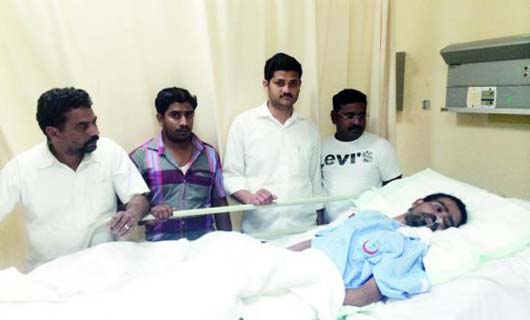
Jeddah, Mar 31: The body of an Indian expat who had fallen into a coma after being hit by a car within merely two months of arriving in the Kingdom was finally repatriated on Saturday after almost two years since the fatal incident occurred.
Thirty-one-year-old Zahid Hussain, from Bihar in India, had arrived in a remote village near Khamis Mushait in May of 2012 to work as a heavy vehicle driver.
Hussain was walking on a pedestrian path when he was hit by a speeding car driven by teenagers on July 24 of that year.
Hussain, who had come to the Kingdom after numerous attempts through manpower agents back home, had been in a coma at the Khamis Mushait General Hospital ever since. Police arrested the two youth who were responsible for the accident.
Jeddah Gov. Prince Mishaal bin Abdullah arranged for the repatriation of the body on Saturday with the help of the Indian Consulate, a move which took nearly four months.
The governor had been made aware of the incident through the Jeddah Traffic Police.
Back home, Hussain’s wife was forced to work as a housemaid and his son a child laborer at a tea shop to repay the interest on the loan Hussain had taken to come to the Kingdom.
“His family hadn’t heard anything from Zahid since they do not have any friends or relatives in the Kingdom,” Shaikh Kauser, the victim’s brother, told Arab News from New Delhi on Saturday.
“We borrowed money to come to New Delhi to receive our brother’s body since we come from a poor family,” he said. “Even Zahid’s son was forced to drop out of school to work as a tea boy to make ends meet.”
“It was a lengthy process getting the victim repatriated to India,” said Ashraf Kuttichal, an Indian social worker in Abha, who flew with the body to New Delhi.
“The victim’s sponsor had not applied for a residency permit for Zahid even though he was working for him,” he said. “This hampered the repatriation process, since you need an iqama to apply for a final-exit visa. The sponsor had also refused to pay late penalties for failing to apply for Zahid’s iqama. It was the Indian Consulate that finally paid the penalty on his behalf.”
“The hospital had initially refused to discharge Hussain after we had finally overcome these legal hurdles, saying he was unfit for travel,” said Kuttichal. “They eventually agreed and Indian Consul General Faiz Kidwai sanctioned just under SR17,000 to transport Hussain’s body on board a Saudia flight.”





Comments
Add new comment